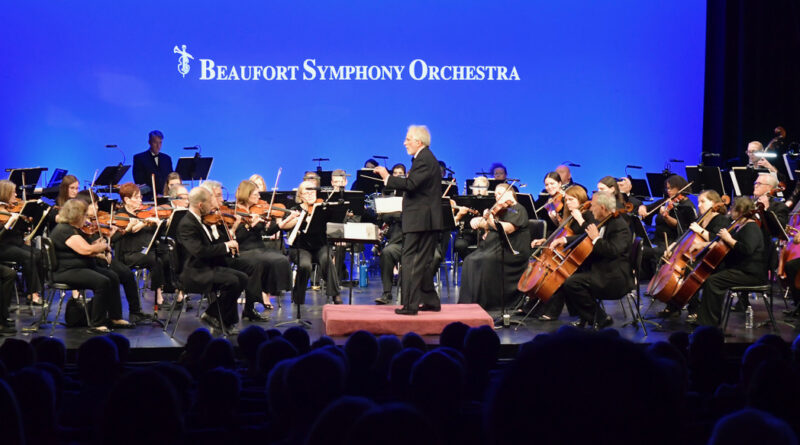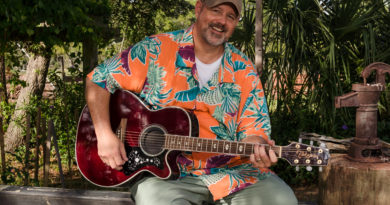Beaufort Symphony Orchestra
A Harmonious Journey with Maestro Fred Devyatkin’s Baton
story by JEANNE REYNOLDS photos courtesy of BEAUFORT SYMPHONY ORCHESTRA
When Fred Devyatkin and his late wife, Katie, left New York City in 1982 as young but supremely talented violinists to play for the Savannah Symphony — only to see it go bankrupt within a decade — it might not have seemed like a great career move. But years later, Fred says he was in the right place at the right time.
“It was fortuitous timing,” he says. “I started conducting what was then the Beaufort Chamber Orchestra and had the opportunity to build it from a small community group with about 15 members — and maybe 30 people in the audience — into the Beaufort Symphony Orchestra (BSO). It was in its infant stage but showed great potential.”
It was also a fast-track to the podium for a musician interested in moving from concertmaster (the principal first violinist) to conductor.
“There are a few different routes to becoming a conductor,” Fred explains. “One is the audition circuit, which is very competitive. Another is to be an assistant conductor, be mentored and occasionally substitute, and then eventually move into the conductor’s role. The third is to build an orchestra and get people to follow you. That’s what I got to do in Beaufort. I got the opportunity to grow with the orchestra. I learned how to conduct and got lots of ‘podium time.’”
Under Fred’s baton, the BSO has become one of the most beloved small-town orchestras in the country. Its 45–55 professional and semiprofessional musicians present four concerts a season, including an autumn classical concert, a holiday concert, a spring classical concert, and a late spring pops concert.
But don’t confuse “fast-track” with “overnight success.” Fred began studying violin at age six and boasts some serious chops, including admission to the Manhattan School of Music, where he studied with Erick Friedman, then freelancing in the New York metropolitan area while studying orchestral repertoire with New York Philharmonic concertmaster David Nadien. When he moved to Savannah, he continued his studies with William Preucil, then concertmaster of the Atlanta Symphony.
And after more than three decades at the podium, does he now prefer conducting or playing? Hmm, both.
“It’s like asking if I prefer hugs or kisses,” Fred says.
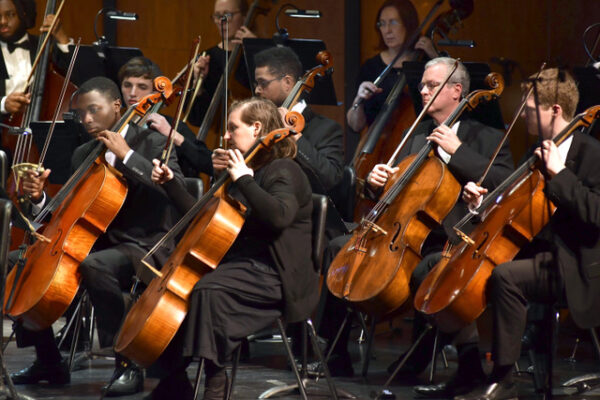
TEARING DOWN BARRIERS
Anyone who attends a BSO performance quickly learns two things: The quality of the music is outstanding, and the conductor is as far from a stereotypical esoteric artiste as a piccolo is from a timpani drum. During each concert, patrons enjoy Fred’s educational and often amusing insights about the music and composers, delivered in his trademark enthusiastic style. His comments may sound off-the-cuff, but they’re based on deep knowledge.
“I don’t use notes.” Fred says. “I read several biographies of the composer and share the history of the piece. I talk to the audience like it’s one person and we’re having a chat. We relate on a human basis.”
“There’s an invisible barrier when the conductor has his back to the audience. We discuss the music in a nonprogrammed way and dissolve that barrier. We’re not teaching about music, we’re teaching music.”
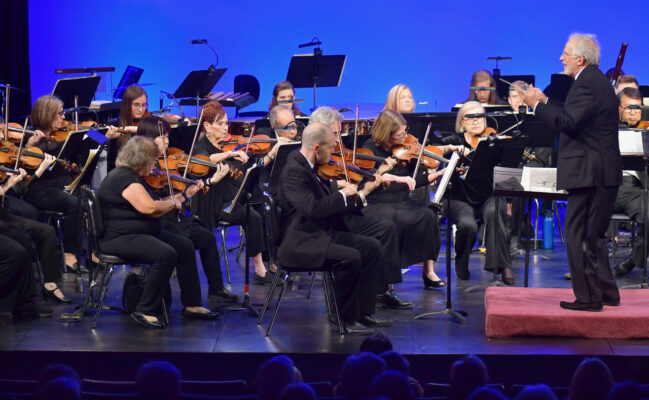
IN TUNE WITH TEACHING
In fact, teaching has always played a major chord in Fred’s music career. In addition to his work with the BSO, he’s been a private violin teacher and continues to serve as orchestra director for Saint Andrew’s School, an independent college preparatory school in Savannah.
In 1999, Fred also realized his dream of forming a youth orchestra. In the quarter century since a nucleus of young players presented the first concert, the Beaufort Symphony Youth Orchestra (BSYO) has grown to dozens of members and attracts students from Beaufort, Bluffton, Hilton Head, and Savannah, playing six concerts a year. Under Fred’s direction, the BSYO strives to inspire students to develop a passion for and love of music, learn that hard work is critical to success, and to contribute to the community by sharing their time and talent. BSYO students are frequently spotted as members of music quartets and performing at local festivals, city celebrations, charities, and houses of worship. In turn, the BSO board provides scholarships for talented young musicians to access private lessons and summer music programs.
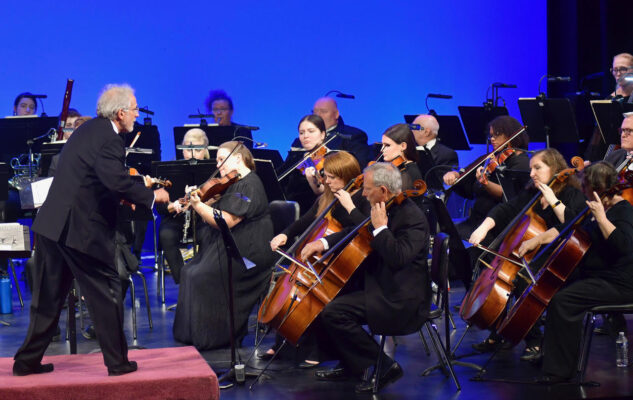
HARMONY BETWEEN TALENT AND DISCIPLINE
Whether working with youth or adults, Fred says he has the same goal.
“I try to marry talent to discipline. There are lots of talented people out there, but ours are also quite disciplined. The BSO plays with a lot of heart and commitment. It means the world to them. They’re doing the best they possibly can every time. And they support each other. When the violins nail a challenging section, the winds and brass start cheering for them. One of the best compliments I ever got was after a former teacher heard us play and told me, ‘Fred, your orchestra plays for you.’”
The love clearly goes both ways.
“I think of the BSO as a jewel. You can go to a ‘real’ concert and hear top-flight soloists. We don’t dumb it down — it’s the real deal. The BSO plays some of the greatest music ever written, music some people wouldn’t otherwise listen to. Our performances are completely authentic and purposeful.
“Music doesn’t depict emotions, it embodies them. Music can do things words cannot.”

